Megan Dunn – 19 May, 2014
Worm Tank contains an open mouthed fishy mug and a blue benevolent ceramic caterpillar (presumably, the worm). A collection of bric-a-brac rests at the bottom of Excess Tank: the leftover ingredients of some primordial soup. Mike Kelley's spirit presides over the dubious contents of each one like a whiff of oxygen weed; something from the past, still breathing.
Snake, Tanks & Drapes is Dan Arps’ second show at Robert Heald Gallery and this time it’s pretty in pink. Three large wall paintings on children’s pink patterned ‘drapes’ set the tone. Pastel hearts, butterflies and other stock images of sweetness now interact with white washed paint, several Chux cloths and in one instance a tea towel. Arps’ mixed media paintings are titled: First, Second and Third Attempt. This is formalism gone goo-goo.
And it’s fun. Igor is a cartoon sketch inside a thick polystyrene frame made from cast polyurethane. The rough-cut mismatched frame adds bulk to the image: Igor, the hunchback, is giving the thumbs up. Several sketches of Frankenstein’s monster also lurk inside the frame. Apparently Igor came out of a bunch of drawings Arps recently did to entertain his son. Igor and Frankenstein’s monster are fitting mascots: the monstrous mashed-up textures in Arps’ work invite touch. Making art is messy. Stuff can get fucked up.
On the gallery floor, two fish tanks operate as counterpoints to the large rectangular ‘drapes.’ Each glass tank becomes a miniature stage showcasing a mixture of the exotic and everyday. Worm Tank contains an open mouthed fishy mug and a blue benevolent ceramic caterpillar (presumably, the worm). A collection of bric-a-brac rests at the bottom of Excess Tank: the leftover ingredients of some primordial soup. Mike Kelley’s spirit presides over the dubious contents of each fish tank like a whiff of oxygen weed; something from the past, still breathing.
A childhood trope links Snake, Tanks & Drapes yet never confines it. Data Traveller is a pram pushed towards one wall. A hard drive sits in the pram’s undercarriage; a plastic rubbish bin is strapped into the front seat. Push the bin’s lid open: a cucumber and a sprig of spring onions. What does it mean? The yellow strap across the outside of the bin accentuates the Mello Yello can placed on the floor. Mello Yello first hit the market in 1979; the can’s retro design sports two sets of parallel lines. Is Data Traveller about built in obsolescence or time’s elastic stretch?
Doesn’t matter. The snake eats its own tail. Arps’ ouroboros are looped, lumpen and abstract. Ouroboros Figure I sits on the floor; Ouroboros Figure II hangs on the wall. Each work is composed from polyurethane, enamel paint and clay. These sculptural forms are off-white, Ouroboros I emanates a faintly toxic green tinge. Both snakes are smeared with milky enamel. Process is worn like an unshed skin. Arps’ ouroboros recall the hands-on pleasure of making mud pies.
It’s easy to get white dirty. Maybe that’s the attraction for Arps? His 2012 exhibition White Paintings at Ferari Space was a primitive yet sophisticated response to the history of monochromatic painting. The post-art school scene is frequently dominated by average-sized abstraction. Forget the cliché, “my five-year-old could do it,” it’s more a case of, “my thirty-five-year old could do it.” Arps’ point of view, and use of materials, is singular in this overpopulated landscape. Part of his project involves loosening the grid. At Robert Heald Gallery, Painting for Welfare Office wears its pink bars like a sewage grate. This chunky polyurethane piece is paired next to Schreber Monument (Chocolate/Candy Version).
The Schreber Monument series is stunning. Each image includes a thumb-struck sun emitting damaged rays. Relics, Arps’ first show at Robert Heald in 2013, featured two works from the series: Sunburst Version and Washed Out Version. These tactile reliefs are compelling and confounding. The works are semi-abstract, as though the image has melted or escaped unfinished from a mould. The series is named after Daniel Paul Schreber (25 July 1842 - 14 April 1911), a German Judge who went insane; he believed hundreds of people’s souls were contacting him via “divine rays.” Schreber’s book, Memoirs of My Nervous Illness, was analysed by Freud and has become an important text in the history of psychiatry and psychoanalysis (no, I haven’t read it).
But in 2000, Giovanni Intra reviewed Memoirs of My Nervous Illness for Bookforum: “Schreber is appealing because his writing is loose and vague, full of sex and politics-a kind of information pornography. It fulfills the pleasures of his readers whatever their ideological persuasion.”
Giovanni Intra is perhaps a natural reference point. Arps’ article, Towards a Positive Cynicism, begins with a different account of Intra’s continuing influence. First published in un Magazine last year, Towards a Positive Cynicism, is a fresh and frank insight into Arps’ own ideological persuasion.
Snake, Tanks & Drapes is a loose and vague exhibition, but it’s tightly composed too. There’s method in Arps’ madness.
Megan Dunn
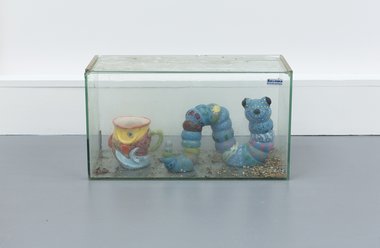
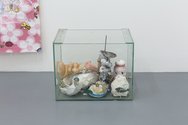

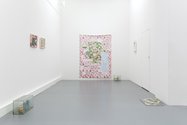

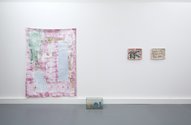

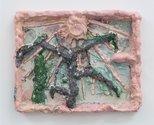
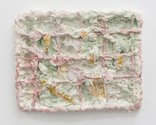
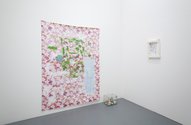

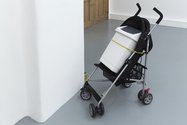

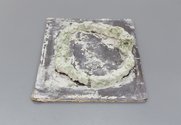

 Advertising in this column
Advertising in this column Two Rooms presents a program of residencies and projects
Two Rooms presents a program of residencies and projects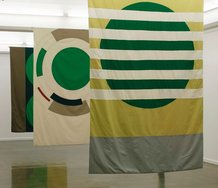
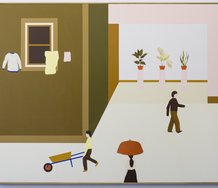
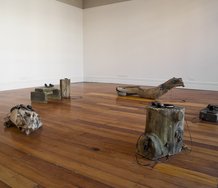
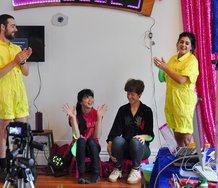
This Discussion has 0 comments.
Comment
Participate
Register to Participate.
Sign in
Sign in to an existing account.